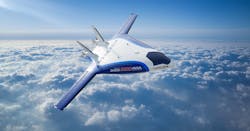ZeroAvia, Natilus partner on hydrogen-electric cargo aircraft
SAN DIEGO - Natilus, a developer of autonomous blended-wing body, or BWB, cargo aircraft, and ZeroAvia, which develops hybrid propulsion systems, have announced a partnership to develop hydrogen-electric engines for the Natilus Kona, Jonathan Welsh reports for Flying. Continue reading original article.
The Military & Aerospace Electronics take:
30 May 2023 - ZeroAvia’s ZA600 will be the hydrogen-electric propulsion source offered for the novel Kona short-haul feeder UAV, with the partnership focused on delivering zero-emission and lower cost operations.
The Natilus Kona, with its BWB design, offers increased volume for hydrogen storage, potentially transforming the air cargo delivery industry to one with low-cost, low carbon emissions, while also extending flight range. The partnership with ZeroAvia will leverage their expertise in hydrogen-electric powertrain technology with Natilus’ unique design to create a scalable, long-range, and zero-emission air cargo delivery solution for the entire industry.
Natilus recently validated the performance of the BWB design with flight testing of a quarter-scale Kona prototype aircraft, following three years of wind-tunnel testing, while ZeroAvia has now conducted eight test flights of its prototype ZA600, 600kW engine in a 19-seat testbed aircraft.
Related: ZeroAvia to retrofit Alaska Airlines regional turboprop to hydrogen
Related: UPS feeder airline intends to buy 20 pilotless cargo planes
Related: Honeywell announces tech to turn hydrogen and CO2 into lower-carbon aviation fuel
Jamie Whitney, Senior Editor
Military + Aerospace Electronics
